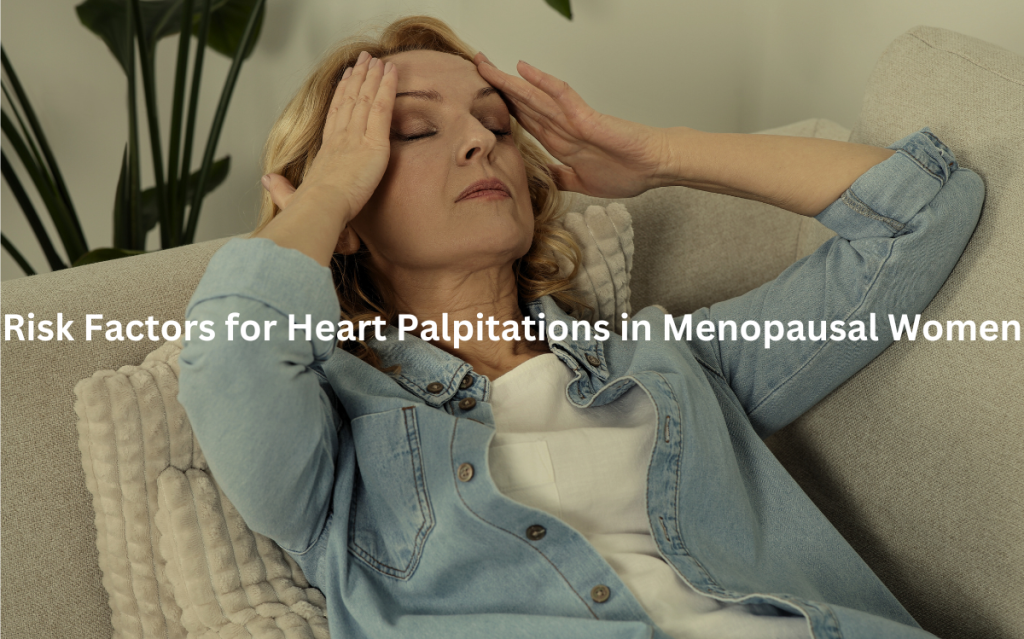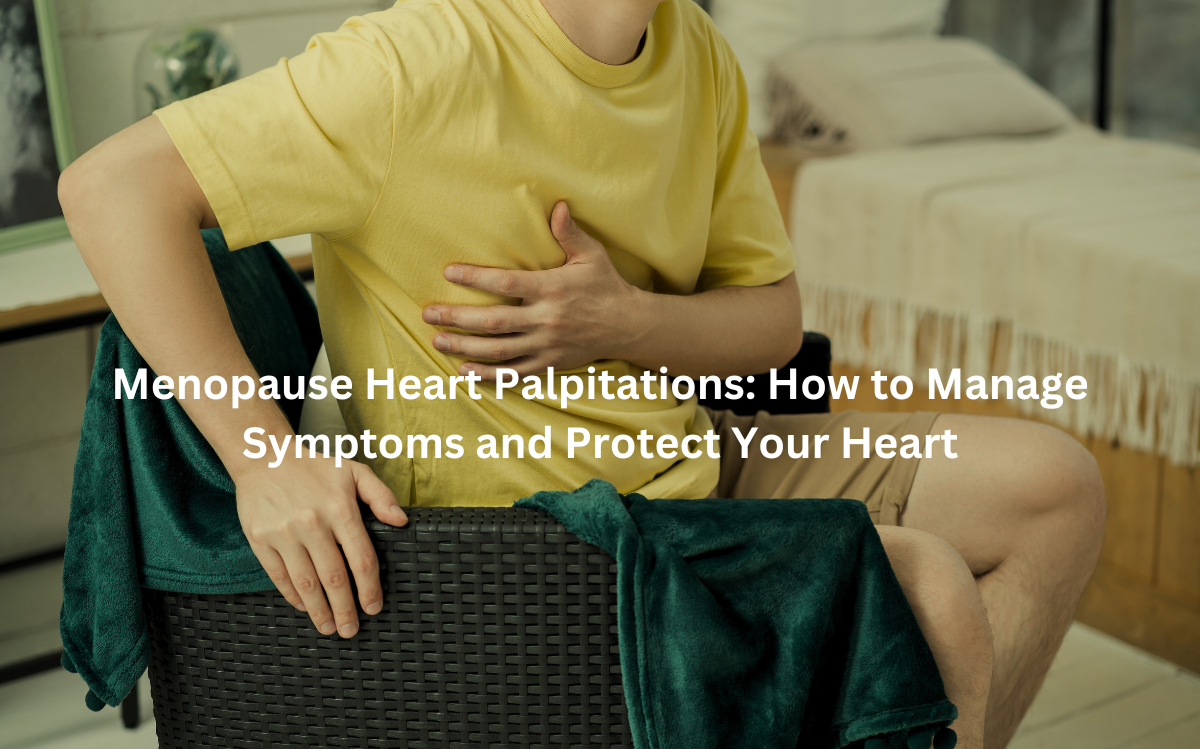Learn how to manage menopause heart palpitations and safeguard your heart health with practical tips and treatment options.
Heart palpitations are a common symptom of menopause, affecting many women as hormonal changes impact the cardiovascular system. These irregular heartbeats can cause discomfort, anxiety, and confusion. (1)
Understanding why they occur, the connection to estrogen decline, and how to manage them is crucial for maintaining heart health during menopause.
Key Takeaways
- Hormonal changes during menopause, particularly the decline in estrogen, can lead to heart palpitations.
- Lifestyle changes, including stress management and regular physical activity, play a significant role in reducing symptoms.
- When palpitations become persistent or are accompanied by chest pain, it’s essential to seek medical attention to rule out serious heart conditions.
What Are Menopause Heart Palpitations?
Heart palpitations during menopause can feel unsettling. Women in this stage of life often describe the sensation as a rapid, fluttering, or pounding heartbeat. It might happen unexpectedly or after physical exertion, sometimes even while resting.
Menopause is typically marked by the gradual end of a woman’s menstrual cycle, often bringing along a cocktail of symptoms. Heart palpitations, while common, can be a bit of a mystery.
The most frequent symptoms of these palpitations include irregular heartbeats, chest discomfort, and shortness of breath.
For some women, these signs can cause anxiety, especially when they are unfamiliar with the cause. Palpitations might occur because of hormonal changes, like the sudden drop in estrogen levels, which influence the heart’s rhythm. It’s important to know, though, that most menopause-related palpitations are harmless and temporary.
How Hormonal Changes Affect Heart Health
When a woman enters menopause, her body goes through significant hormonal shifts, with a marked decrease in estrogen. Estrogen plays a protective role in cardiovascular health, helping to regulate blood vessels, maintain cholesterol levels, and ensure healthy blood pressure. Without it, the body becomes more vulnerable to heart-related issues, such as hypertension and atherosclerosis.
Estrogen’s decline directly impacts the vascular system, increasing the likelihood of heart palpitations. With less estrogen circulating, the heart might become more sensitive to triggers like stress, caffeine, or even a lack of sleep, all of which are common in menopause. This is why some women experience palpitations alongside other menopause symptoms like hot flashes or night sweats, which may also place stress on the cardiovascular system.
Risk Factors for Heart Palpitations in Menopausal Women

Several factors influence the occurrence and severity of heart palpitations during menopause. Lifestyle plays a significant role, with stress being a well-known trigger. Stressful experiences, combined with hormonal changes, create a perfect storm.
Diet is another factor. A diet high in:
- Caffeine
- Sugar
- Processed foods
can elevate the risk of palpitations. A lack of physical activity also contributes to this risk.
Health conditions like hypertension and diabetes increase the chances of experiencing palpitations. Women with a history of heart disease or other heart-related conditions may notice more severe symptoms during menopause. While menopause doesn’t create these risks, it can exacerbate underlying issues, making them more noticeable and harder to manage. (2)
Common Menopause Symptoms Linked to Heart Palpitations
Heart palpitations don’t exist in a vacuum during menopause; they are often accompanied by other common symptoms. Hot flashes and night sweats are two of the most frequent companions to palpitations. These symptoms, which occur due to hormonal fluctuations, can elevate heart rate and trigger feelings of discomfort, leading to palpitations. The body’s attempt to cool down during a hot flash can raise heart rate, which in turn can result in palpitations.
Vaginal dryness and mood swings are also part of the broader menopausal experience and can influence heart health. The hormonal changes that cause vaginal dryness and mood swings are the same that affect the cardiovascular system. For example, anxiety or depression linked to these emotional fluctuations might indirectly cause or worsen palpitations. In fact, many women report feeling a sense of unease or panic during a palpitations episode, which only amplifies the sensation.
Hormone Replacement Therapy (HRT) and Heart Health
For many women, Hormone Replacement Therapy (HRT) is a common solution for managing menopause symptoms, including heart palpitations. HRT works by replacing the estrogen no longer produced by the ovaries, helping to alleviate cardiovascular symptoms like palpitations. Research shows that HRT can:
- Reduce the frequency of hot flashes
- Stabilise mood swings
- Protect against long-term heart disease
However, HRT isn’t without its risks. For women with pre-existing heart conditions or a high risk of cardiovascular disease, HRT could be a double-edged sword. Some studies suggest that starting HRT later in life, particularly after age 60, may increase the risk of:
- Blood clots
- Stroke
It’s also important to note that not all forms of HRT are the same. Transdermal estrogen, for example, is considered safer for women at high risk of blood clots compared to oral estrogen.
Other Treatment Options for Menopause-Related Heart Palpitations
If HRT isn’t an option or doesn’t suit a woman’s preferences, there are other ways to address menopause-related heart palpitations. Non-hormonal treatments can effectively manage both physical and emotional symptoms of menopause. Medications like:
- Selective serotonin reuptake inhibitors (SSRIs)
- Gabapentin
These can help manage anxiety, which often accompanies palpitations, reducing their frequency.
Lifestyle changes also play a significant role. Incorporating regular physical activity is one of the best ways to combat palpitations. Exercise helps:
- Regulate heart rate
- Control blood pressure
- Make the heart more resilient
A heart-healthy diet rich in:
- Fruits
- Vegetables
- Whole grains
- Lean protein
Supports cardiovascular health and may reduce palpitations. Additionally, techniques like mindfulness, yoga, and deep breathing can lower stress, a major trigger for palpitations.
When to Seek Medical Help for Menopause Heart Palpitations
While menopause heart palpitations are typically harmless, there are certain situations when they warrant medical attention. If palpitations are persistent, occur with chest pain, or are accompanied by shortness of breath, it’s crucial to seek help. These could be signs of a more serious heart condition, such as arrhythmia or even a heart attack. A doctor may recommend tests, such as an electrocardiogram (ECG) or an echocardiogram, to assess heart function and rule out any underlying issues.
If the palpitations are new or significantly different from what a woman has experienced in the past, it’s also a good idea to consult a healthcare provider. This can help determine whether menopause or another medical condition is the root cause. An accurate diagnosis is key to finding the right treatment and ensuring overall health.
Managing Menopausal Heart Palpitations: Practical Tips
Managing heart palpitations during menopause doesn’t have to be complicated, and can often be addressed with lifestyle modifications. Here are some key strategies:
- Stress management: Simple techniques like deep breathing exercises, meditation, or yoga can reduce anxiety and help regulate heart rhythm. A relaxed mind leads to a more stable heartbeat.
- Physical activity: Cardiovascular exercise—such as walking, swimming, or cycling—helps maintain heart health and prevent palpitations. Regular exercise also promotes better sleep, which reduces the likelihood of night sweats and hot flashes, further preventing triggers.
- Heart-healthy diet: Avoiding stimulants like caffeine and alcohol can help keep heart rhythm steady. Focus on foods rich in omega-3 fatty acids, antioxidants, and fiber to support cardiovascular health and balance hormones.
- Hydration: Dehydration can worsen palpitations, so drinking enough water throughout the day is essential.
For women looking to reduce palpitations, focusing on overall well-being is key. Gradual changes, like incorporating stress-relief techniques and increasing physical activity, can have lasting effects on heart health.
Managing menopause heart palpitations is an ongoing process, but with the right approach, women can maintain control over their heart health and enjoy a smoother transition into the next phase of life.
Conclusion
Managing heart palpitations during menopause requires a tailored approach. Hormonal changes often trigger palpitations, but treatments like hormone replacement therapy (HRT), medications, or lifestyle changes can help.
Regular exercise, a balanced diet, and stress reduction techniques, like yoga, support heart health. It’s crucial to work with healthcare providers to find the right solution, as each woman’s needs vary. A combination of awareness, proper treatment, and healthy habits can effectively manage palpitations and improve overall well-being during menopause.
Book a consultation with Modern Menopause to explore personalised care for managing heart palpitations and other menopause symptoms.
FAQ
What causes heart palpitations during menopause?
Heart palpitations during menopause are often caused by hormonal fluctuations, particularly the drop in oestrogen. Stress, diet, and lack of physical activity can also trigger palpitations. Women with pre-existing heart conditions, like hypertension or diabetes, may notice an increase in these symptoms as menopause exacerbates underlying health issues.
How does HRT affect heart palpitations?
Hormone Replacement Therapy (HRT) can help manage menopause symptoms, including heart palpitations. By replacing lost oestrogen, HRT may reduce the frequency of palpitations. However, for women with heart conditions, HRT might pose risks, such as increased blood clot or stroke risk, especially if started after age 60.
Can lifestyle changes help reduce heart palpitations during menopause?
Yes, lifestyle changes like regular physical activity, stress management, and a heart-healthy diet can reduce heart palpitations. Exercise regulates heart rate, while stress-reduction techniques like yoga or deep breathing can help stabilise heart rhythm. Avoiding stimulants like caffeine and alcohol can also be beneficial.
Are non-hormonal treatments effective for managing palpitations during menopause?
Non-hormonal treatments like SSRIs or gabapentin can help manage the anxiety that often accompanies palpitations, reducing their frequency. These medications can be a good option for women who cannot or prefer not to use HRT, particularly if anxiety is a trigger.
Is it safe to use HRT if I have a history of heart disease?
For women with a history of heart disease, HRT should be approached cautiously. Transdermal forms of HRT are generally safer than oral ones, as they carry a lower risk of blood clots. Women should consult their healthcare provider to weigh the risks and benefits before starting HRT.
References
- https://pmc.ncbi.nlm.nih.gov/articles/PMC9289918/
- https://thebms.org.uk/wp-content/uploads/2024/12/22-BMS-TfC-Management-of-menopause-for-women-with-CVD-DEC2024-A.pdf

Leave a Reply